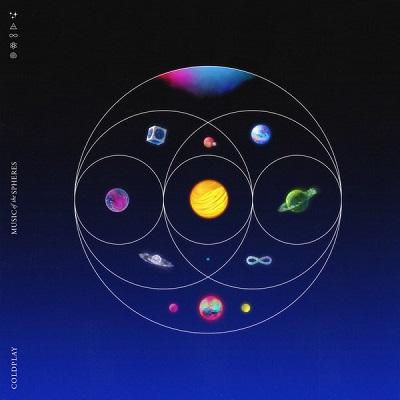Album Review: Coldplay – Music of the Spheres
4 min read
Coldplay have joined Elon Musk, Jeff Bezos and William Shatner (that can’t be right, can it?) and have entered the space race with their ninth studio album Music of the Spheres. After the lacklustre performance of Everyday Life, Coldplay has recruited Swedish super-producer Max Martin in a herculean attempt at reaching a younger audience, with an album that is more pop than my Now That’s What I Call Music! 36 CD.
 Music of the Spheres is a space-themed concept album set in a fictional planetary system known as The Spheres. No, I have not fallen over and banged my head on the toaster; that is the actual basis of the album. Long gone are the days of singing songs about girls and loneliness; Coldplay has done what we all do when we are in a creative slump: “screw it, we’re just gonna sing about aliens!” Music of the Spheres is twelve tracks of intergalactic pop mixed in with new age keyboards and Chris Martin’s signature falsetto. Its sounds are thematic and boastful, with a message of interplanetary kindness sprinkled throughout.
Music of the Spheres is a space-themed concept album set in a fictional planetary system known as The Spheres. No, I have not fallen over and banged my head on the toaster; that is the actual basis of the album. Long gone are the days of singing songs about girls and loneliness; Coldplay has done what we all do when we are in a creative slump: “screw it, we’re just gonna sing about aliens!” Music of the Spheres is twelve tracks of intergalactic pop mixed in with new age keyboards and Chris Martin’s signature falsetto. Its sounds are thematic and boastful, with a message of interplanetary kindness sprinkled throughout.
Martin has said that he found inspiration in the Star Wars film franchise where he speculated what musical sounds otherworldly creatures would make. This fascination led to the basis and heart of Music of the Spheres. The band even went so far as to create a make-believe solar system with planets that correspond to each song on the album. These fictional planets include Floris, Kubic, and Calypso. Coldplay has conceived an entire celestial body and rather than being constrained by their efforts, they have found freedom and a chance to experiment. Martin expressed the bands autonomy to USA Today: “We’ve just abandoned any form of rules and if something feels cool, we’ll do it.” The one thing you can’t say about Coldplay is that they are afraid of change.
The album opens with an instrumental track that creates a vision of space-age pop idealism; synthesizers are used and sonic sounds beam in and out as we hear the spoken words “Music of the Spheres” in a computerised dashboard tone. We are engulfed in a wall of ambient noise and alien tones that leads us into the second track, Higher Power. With its hypnotic, revolving bass line and its catchy pop hooks, Higher Power is Coldplay channelling the pop charts of today whilst simultaneously promoting the power of songs: “When for so long I’d been down on my knees / Then your love song saved me over and over.” It seems that even an alien likes a good ol’ love song every now and then. The band follow-up this message with Humankind, a song that owes a debt to Bruce Springsteen in its stadium-sized sound and melodic, enthusiastic keyboards. The repetitive chorus is punctuated by Pete Townsend inspired guitar thumps and easy to remember lyrics. This is Coldplay with the whole universe behind them.
Let Somebody Go with Selena Gomez is a lovely ballad about heartbreak; its use of simple lyrics such as “That it hurts like so / To let somebody go” and simple keyboards make the duet easy to listen to and easy to understand. Martin feels at home singing a love song, you can almost imagine him putting on a dressing gown and making a cup of earl grey tea before recording this lullaby of lost love. Music of the Spheres is an album that yearns to connect as many people as possible in its universal themes. The use of emoji’s as song titles is a perfect example of this, for what is more universal than a heart emoji? My Universe is a collaboration with BTS, the K-pop titans who will one day rule the world. The song is so catchy that it has put me in a hypnotic trance where I repeat the chorus over and over again to myself as I watch my girlfriend pack her bags and leave me for good. When Coldplay play to their strengths the concept album truly shines and feels vital.
The trouble begins when they diverge from their trajectory and try to make the space opera more than it actually is. Human Heart with We Are KING and Jacob Collier is a layered vocal a cappella about the fragility of boys and girls existence; it tries so hard to be sincere but comes across as boring and void of emotion. Biutyful is another example of a clear message that is lost in overproduction. The song is about universal love and how we as a human race are all connected by our ability to love, however, this message is undercut by the addition of a distorted alien voice that practically mocks its authenticity. I’m reminded of that old adage “just because you can doesn’t mean you should.”
Music of the Spheres is at its best when it’s being its most playful. With the help of Max Martin, the British icons have produced an album that is incredibly enthusiastic and at times brazen with its sound. Much like The Beatles who began Sgt. Pepper’s Lonely Hearts Club Band as a concept album but then gave up after Billy Shears, Music of the Spheres feels more like a jumping off point to an idea that has not been fully realised. With the addition of a misused football chant that feels more out of place than me giving a Ted talk on how to save money, Coldplay’s ninth studio album may contain some space debris but that won’t stop you zipping up your spacesuit and bouncing up and down to Coldplay’s astral musings, especially when they receive a little help from their friends.



